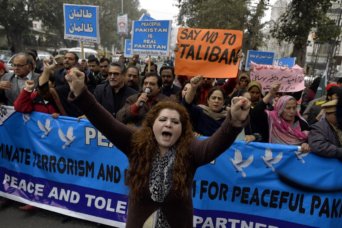- About
- Topics
- Picks
- Audio
- Story
- In-Depth
- Opinion
- News
- Donate
- Signup for our newsletterOur Editors' Best Picks.Send
Read, Debate: Engage.
| editor: | Neelo Aysha Scholz |
|---|
The nation accused of harboring Osama bin Laden and itself the target of thousands of terrorist attacks since 9/11 has unleashed its National Action Plan against terrorism. The attack on a Peshawar army school on Dec 16th provoked the wrath of the powerful in the country. Many of the students were from army families whom the Taliban claimed to be targeting.
In response to this horrific attack, the Prime Minister, Nawaz Sharif spearheaded a constitutional amendment allowing military courts to prosecute terrorism suspects, to be signed into law. Convicted terrorists would then be hanged within “10-15 days” of sentencing, he told reporters.
But as Human Rights Watch points out, this move will run counter to some of Pakistan’s international human rights obligations. "As a party to the International Covenant on Civil and Political Rights, Pakistan is obligated to uphold and take measures to ensure basic fair trial rights. Governments may not use military courts to try civilians when the regular courts are functioning."
Authorities justify military courts as necessary for the speedy trials of terrorist suspects to circumvent loopholes of the civilian justice system. Pakistan's civil courts have a well-earned reputation for prosecutions undermined by both corruption and a terribly slow judicial process.
The speedy trials starting Jan 21st come at a lofty cost though: undermining the rule of law. As former Supreme Court chief justice points out, the basic structure of the constitution guarantees that “military courts cannot be established in the presence of an independent judiciary”.
Sharif’s response to concerns about military courts was, “ I don’t think people who slaughter others deserve sympathy”, missing the point that he had overridden the rule of law once again in a nation that desperately needed it. To hand over more power to the army is taking it further away from developing into a healthy, functioning nation. Pakistan has been under military dictatorships for a total 33 years since its inception in 1947.
HRW suggests, “A commitment to uphold the rule of law and to strengthen the civilian judiciary would be a far more powerful weapon against militant atrocities.”
The plan includes prohibitions on funding of alleged terrorist organisations and legal penalties for hate speech.
Image: AFP
